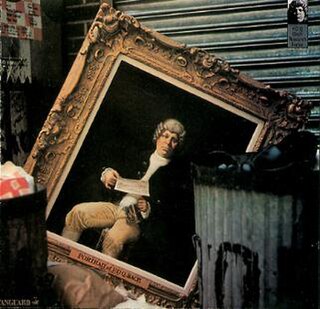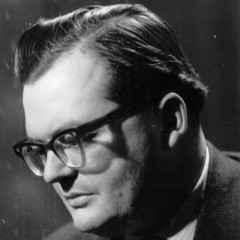
Albert Einstein was a German-born theoretical physicist who is widely held as one of the most influential scientists. Best known for developing the theory of relativity, Einstein also made important contributions to quantum mechanics. His mass–energy equivalence formula E = mc2, which arises from special relativity, has been called "the world's most famous equation". He received the 1921 Nobel Prize in Physics for "his services to theoretical physics, and especially for his discovery of the law of the photoelectric effect".

Philip Glass is an American composer and pianist. He is widely regarded as one of the most influential composers of the late 20th century. Glass's work has been associated with minimalism, being built up from repetitive phrases and shifting layers. Glass describes himself as a composer of "music with repetitive structures", which he has helped to evolve stylistically.

Akhnaten is an opera in three acts based on the life and religious convictions of the Egyptian pharaoh Akhenaten, written by the American composer Philip Glass in 1983. The libretto is by Philip Glass in association with Shalom Goldman, Robert Israel, Richard Riddell, and Jerome Robbins. According to the composer, this work is the culmination of a trilogy including his two other biographical operas, Einstein on the Beach and Satyagraha. These three people were all driven by an inner vision which altered the age in which they lived: Akhenaten in religion, Einstein in science, and Gandhi in politics.

P. D. Q. Bach is a fictional composer created by the American composer and musical satirist Peter Schickele for a five-decade career performing the "discovered" works of the "only forgotten son" of the Bach family. Schickele's music combines parodies of musicological scholarship, the conventions of Baroque and Classical music, and slapstick comedy. The name "P. D. Q." is a parody of the three-part names given to some members of the Bach family that are commonly reduced to initials, such as C. P. E. for Carl Philipp Emanuel Bach; PDQ is an initialism for "pretty damned quick".

Einstein on the Beach is an opera in four acts composed by Philip Glass with libretto in collaboration with Robert Wilson, who also designed and directed early productions. The opera eschews traditional narrative in favor of a formalist approach based on structured spaces laid out by Wilson in a series of storyboards which are framed and connected by five "knee plays" or intermezzos. The music was written "in the spring, summer and fall of 1975.""mostly in Cape Breton, Nova Scotia." Glass recounts the collaborative process: "I put [Wilson’s notebook of sketches] on the piano and composed each section like a portrait of the drawing before me. The score was begun in the spring of 1975 and completed by the following November, and those drawings were before me all the time."

Paul Hamilton Williams Jr. is an American composer, singer, songwriter, and actor. He is known for writing and co-writing popular songs performed by a number of acts in the 1970s, including Three Dog Night's "An Old Fashioned Love Song" and "Out in the Country", Helen Reddy's "You and Me Against the World", Biff Rose's "Fill Your Heart", and the Carpenters' "We've Only Just Begun" and "Rainy Days and Mondays". He also wrote "Cried Like a Baby" for teen idol Bobby Sherman.

Ernst Heinrich Krenek was an Austrian, later American, composer. He explored atonality and other modern styles and wrote a number of books, including Music Here and Now (1939), a study of Johannes Ockeghem (1953), and Horizons Circled: Reflections on my Music (1974). Krenek wrote two pieces using the pseudonym Thornton Winsloe.

The Semperoper is the opera house of the Sächsische Staatsoper Dresden and the concert hall of the Staatskapelle Dresden. It is also home to the Semperoper Ballett. The building is located on the Theaterplatz near the Elbe River in the historic centre of Dresden, Germany.

A Night at the Opera is the fourth studio album by the British rock band Queen, released on 28 November 1975, by EMI Records in the United Kingdom and Elektra Records in the United States. Produced by Roy Thomas Baker and Queen, it was reportedly the most expensive album ever recorded at the time of its release.

The Staatskapelle Berlin is a German orchestra and the resident orchestra of the Berlin State Opera, Unter den Linden. The orchestra is one of the oldest in the world. Until the fall of the German Empire in 1918 the orchestra's name was Königliche Kapelle, i.e., Royal Orchestra.

Theo Adam was a German operatic bass-baritone and bass singer who had an international career in opera, concert and recital from 1949. He was a member of the Staatsoper Dresden for his entire career, and sang at the Bayreuth Festival from 1952 to 1980. He particularly excelled in portraying roles by Richard Wagner, especially Wotan in Der Ring des Nibelungen, which he also performed at the Metropolitan Opera, among others. In concert, he was a much admired Bach singer and also drew acclaim for his interpretation of the title character of Mendelssohn's Elijah. He was a voice teacher at the Musikhochschule Dresden.

Paul Dessau was a German composer and conductor. He collaborated with Bertolt Brecht and composed incidental music for his plays, and several operas based on them.

Otmar Suitner was an Austrian conductor who spent most of his professional career in East Germany. He was born in Innsbruck and died in Berlin. He was principal conductor of the Staatskapelle Dresden from 1960 to 1964, and then music director at the Berlin State Opera in East Berlin from 1964 to 1990. He was concurrently chief conductor of the Staatskapelle Berlin from 1964 to 1991.
Paul Seiko Chihara is an American composer.

Günther Leib was a German operatic baritone and professor of voice. A Kammersänger of the Dresden State Opera, he sang leading baritone roles both in his native Germany and internationally during the course of his stage career. In 1971 he was awarded the Robert Schumann Prize of the City of Zwickau and in 2017 on the occasion of his 90th birthday the "Gotha-Medaille", honoring him for his international career as "Gotha's most famous voice". He appeared in a number of complete opera and oratorio recordings on the Eterna, Supraphon, and Deutsche Grammophon labels.

Celestina Casapietra was an Italian operatic soprano who was a member of the Berlin State Opera from 1965 to 1993 and appeared at leading European opera houses. She performed a wide repertoire from coloratura roles to Wagner's Elsa in Lohengrin and Giordano's Maddalena in Andrea Chénier, which she recorded on DVD alongside Franco Corelli.

Friedrich Schenker was a German avant-garde composer and trombone player.

Karl Mickel was a German writer.

Bettina is a chamber opera with music by Friedrich Schenker to a libretto by Karl Mickel. The topic is the writer Bettina von Arnim and her relationship with Karoline von Günderrode. The work is described as an "opera for one actress (mezzo-soprano), children's choir, tape and ensemble". Written in 1982, it was premiered at the Theater im Palais in Berlin in 1987, and was published by Breitkopf & Härtel.
Leonce und Lena is a 1979 opera by Paul Dessau after the play Leonce und Lena by Georg Büchner.
















